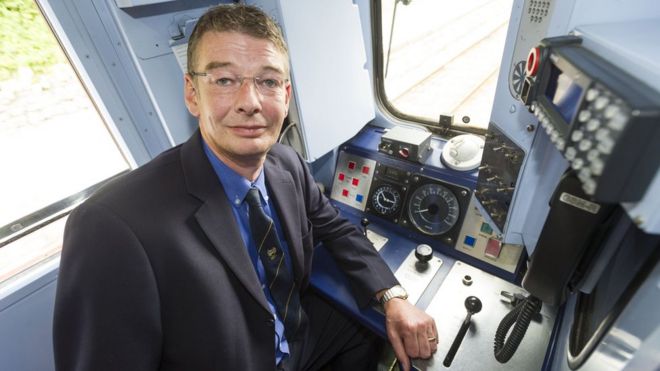The driver's view: 'The memory of a rail suicide never leaves you' Mr Botham has been a train driver for more than 25 yearsFifteen years ago, somebody took their own life by stepping in front of the train Andy Botham was driving. The 50-year-old, from Matlock, Derbyshire, told his story to BBC Radio 5 live.
Mr Botham has been a train driver for more than 25 yearsFifteen years ago, somebody took their own life by stepping in front of the train Andy Botham was driving. The 50-year-old, from Matlock, Derbyshire, told his story to BBC Radio 5 live."I can remember every second of it. At 125 mph (200 km/h), by the time you see something, it's virtually impossible to stop. When you see that person standing in front of your train you do everything you possibly can to encourage them to move out the way. You're blowing the horn, you put the emergency brake on. But then, you just sit looking at what's coming and everything goes into slow motion.
That image is replayed over in your head, time and time again. Your training kicks in and you deal with the signallers, you contact the police, you deal with the incident. You make sure the train's safe and the passengers on the train are safe and nothing's going to happen. Then you sit there and you wait for help to come.
You're spoken to and reports are taken. It takes several hours for the incident to be dealt with and then you're taken home.
Back then, there wasn't the support network that is in place now. It is just honestly the worst thing you can imagine.
Most drivers I've known over the years deal with the immediate moment because that's what we're trained to do.
But when it's over you come home and you've got nobody to talk to. Nobody knows what you've been through, and you can't talk to your family about what it feels like. They don't even know what it's like to drive a train, never mind be in that uncontrolled situation where you can see something's about to happen that's really, really bad and you can't stop.
You go to the doctor - the doctor will sign you off work - but eventually you've got to go back to work to make a living. You've got to go and drive the same trains over the same section of track, day in and day out. The impact wears away but it's always still there. I still drive over the same piece of track now. There's still days where it's the same sort of light, the same sort of day, then it comes flying back to you. You remember it.
One of the worst things was being called to the coroner's court. There they become a real person with a name, an age, a family and their own problems, and you realise how they ended up there. It personally felt just as bad as the day I was involved in the fatality.
Anything you can do to stop somebody taking their own life is worth trying. It's better to try something and if you get it wrong then at least you tried."





